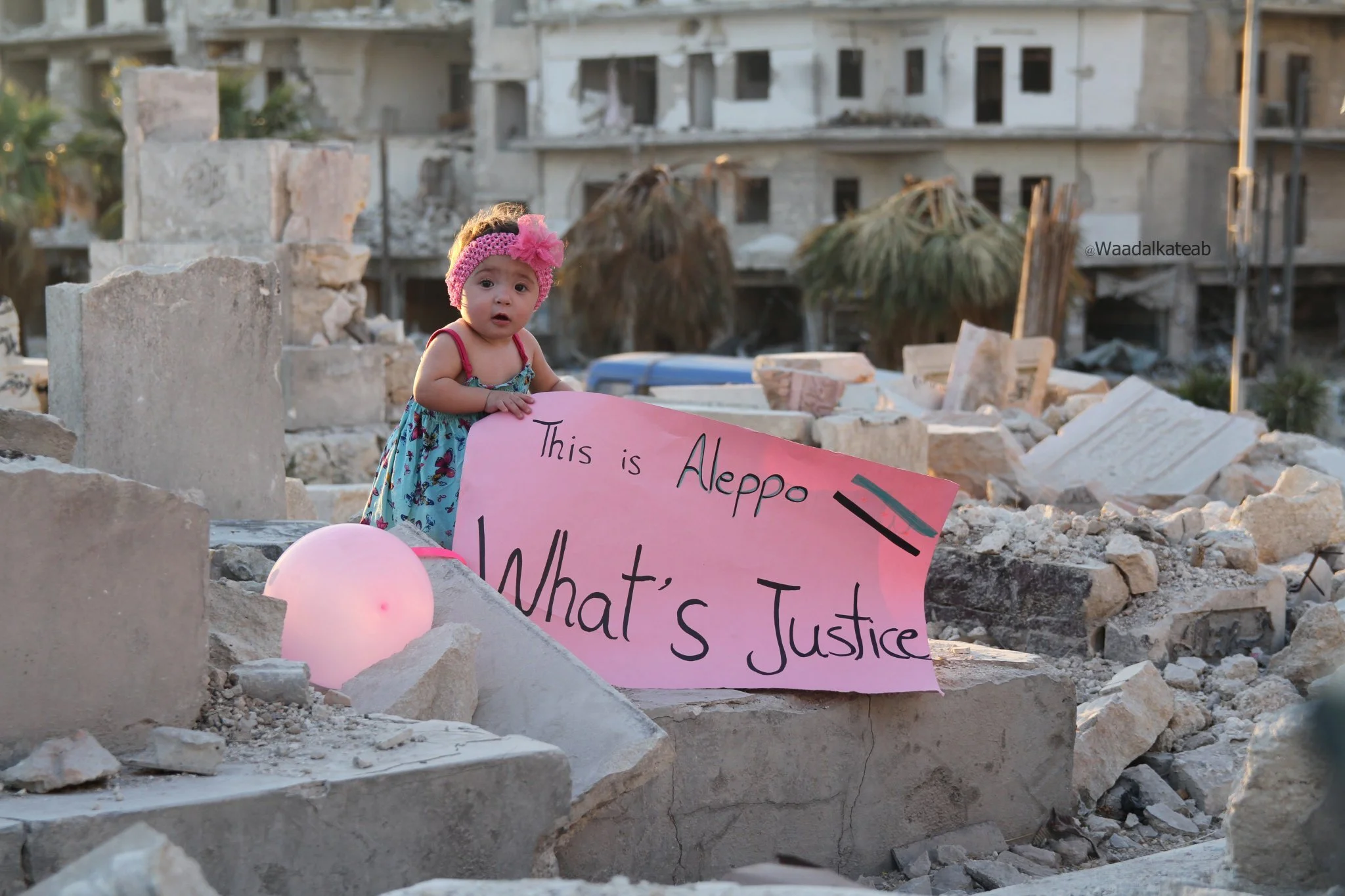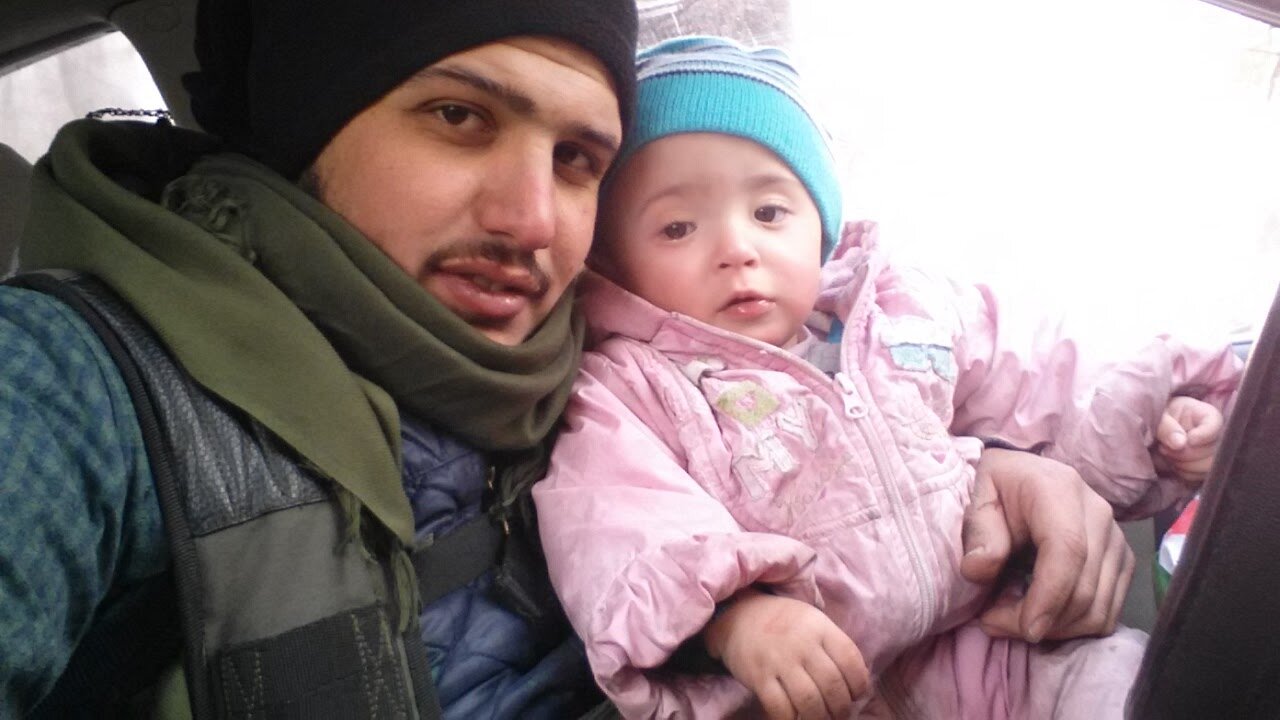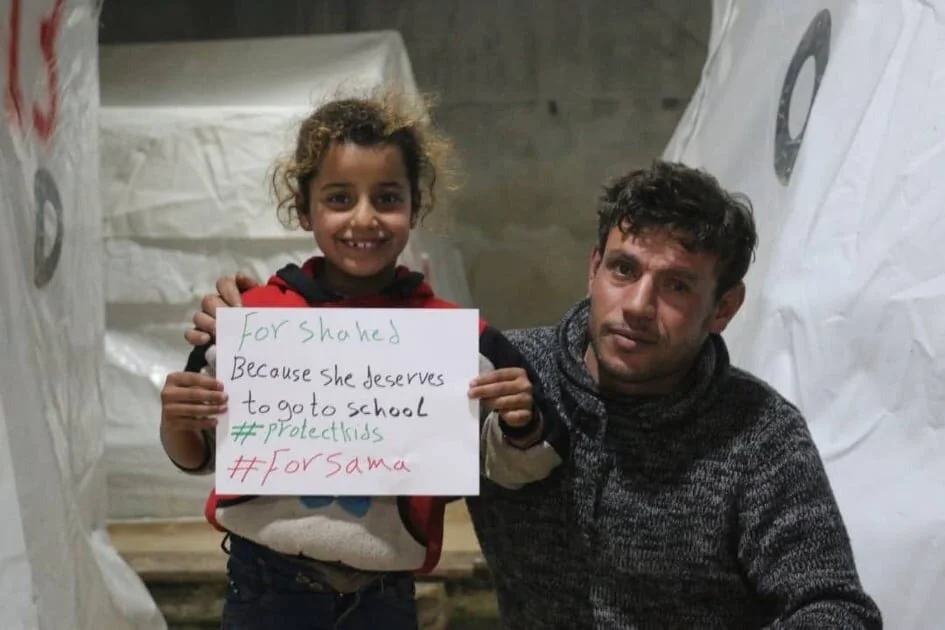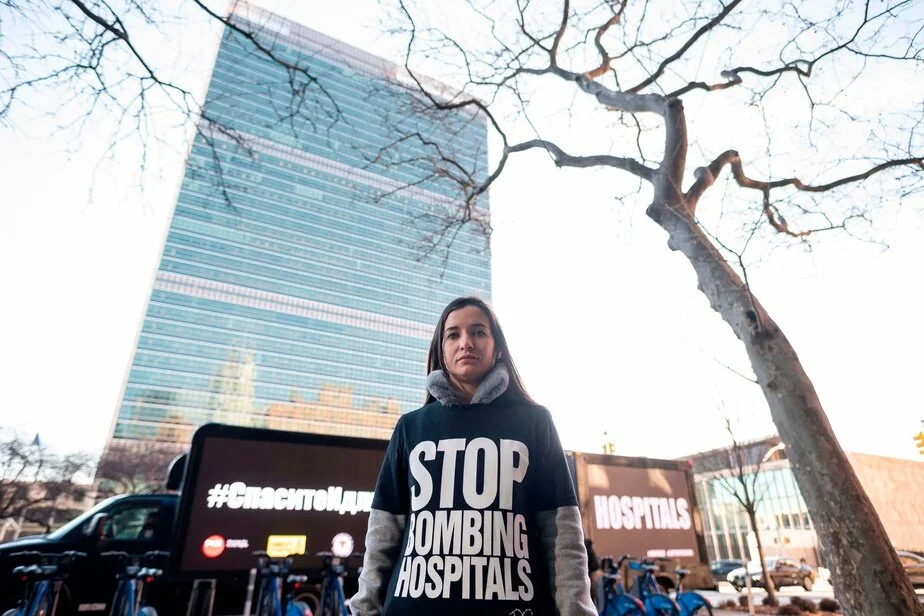
NEWS
'What did you learn from For Sama?' Read these powerful viewer responses...
We are truly honoured and amazed by the incredible reaction to For Sama and, most recently, it was a flood of messages on Instagram that left us completely overwhelmed.
We shared the documentary trailer, asking our Action For Sama followers and supporters the question, ‘What did you learn from watching For Sama?’
The response was beautiful. Hamza and Afraa shared their thoughts too. Take a look….
What did you learn from watching For Sama?
“Never give up.”
“How many memories, dreams and hopes the last flower pot that was taken from garden before leaving home can carry 🌷”
“The Human spirit is powerful, resilient and relentless. Never lose hope.”
“That there can be unwaivering strength and laughter during the worst darkness imaginable.”
“For Sama shows the bitter reality of the wars in Syria. For Sama has taught me that life should be appreciated whatever the difficulties one faces. Because people in Syria still have smile on their faces amid dangerous situations and they still see goodness in things. ❤️”
“For Sama really is one of the most incredible pieces of film I’ve ever seen. Normally it is so easy to change the channel when you see such imagery, as it is so hard to comprehend. The film helped me realise I could no longer choose ignorance. Thank you x”
“We are so proud of you , and I’m proud that I belong to the same country which you belongs too . Keep it up ❤️”
“For me the film humanised a situation which otherwise felt very distant and hard to comprehend. 💜”
“I learned about the Syrian culture and about the place and circumstances that people flee to Europe from. It was deeply moving and educating at the same time.”
“I learnt to be human again x”
“It gave me a visual context to what my Syrian refugee friends have experienced and it gave me even more motivation to keep defending and fighting for their rights, amplifying their voices and stories and highlighting the incredible resilient human beings they are 💙”
~
“I learned something after releasing the film, it shows in all of the comments above: We are all humans and people really care if they were able to see the truth. Before the film, I’ve kind of lost that faith.”
“To live and to make meaning to your life.. To give as much as you can.”
~
Here’s the original post, so you can read every answer and add your own….
‘After 9 years of Disasters in Syria, I fear the arrival of Coronavirus'
I’m Nabil. I currently live in the northern countryside of Aleppo and I have been working in the medical cases department in Molham Volunteering Team since 2017.
Now we are watching the spread of Coronavirus around the world. The area I live in is in huge danger if the virus reaches it, because there are a lot of camps where it is so hard for people to isolate themselves. There is also a lack of knowledge in regards to how dangerous Coronavirus is. Despite this danger, I’m still working. I have to. I visit the medical cases both in houses and tents and I’m following the basic safety guidelines - I’m wearing medical masks and gloves, disinfecting, preventing crowding during patient visiting time, and raising awareness about the Covid-19 and the danger of its spread.
I’m currently working with Dr.Hatem, who used to be in Al-Quds hospital before with us. Now he is the head of Al-Amal hospital (“Al-Amal” means hope in Arabic) - a hospital which specialises in children and women’s health. In the hospital it is hard to avoid direct contact with patients, but we always use basic protection and we continually disinfect the whole hospital. There is also a group of the staff who work solely on raising patients’ awareness and organising the space to make sure there is no crowding.
The danger of the Coronavirus is threatening the whole world. I feel sad about this. I fear the arrival of the Coronavirus to the northern parts of Syria. We’ve already lived through 9 years of disasters: the regime’s crimes, killings and forced displacement. I’m afraid of the spread of Coronavirus because there are many people living in tents, and the difficult economic situation of some families doesn’t allow them to stay in during the pandemic - they have to work to feed their children.
I fear for the repetition of what we went through in Aleppo. The cruelty of all the death we saw there still chases us. The crimes committed against children, women, the elderly. The blood and the massacres. I’m afraid that the same horrible things will come back in different ways, and I fear standing helplessly in front of them.
But I’m still here, with my friends and my family. I will always be prepared to give medical assistance, even when it becomes a danger to our lives. That is our job - our mission.
Finally, I wish for everyone to stand with the families inside of Syria so they could stay in their homes or tents. So they don’t leave and become a danger to themselves and others.
Read More:
WHY CORONAVIRUS IS A TICKING BOMB IN WAR-RAVAGED NORTHERN SYRIA by Arab News
'Watching Covid-19 footage from the hospitals reminds me of Aleppo'
There are many individuals - friends and colleagues of Waad and Hamza - that you will recognise from For Sama. Here is an update from Abd, who shares his reflections from his time in Aleppo in light of the recent Coronavirus situation…
There are multiple ways to die, but the result is always the same. From inside Syria - from what’s left of areas not controlled by the terrorist regime of Al-Assad - I wish for this terrible period to end without you losing a loved one.
I’ve been following the news about the Coronavirus and how it’s affecting the whole world - the panic and fear, how everyone could lose a loved one and how the whole world is sharing the same suffering, even if the danger depends on their living situation and age.
It may be hard for you to imagine the crimes the regime committed in Syria, but it’s very similar to what Corona is doing now - separating loved ones from one another. The difference is that the Assad and Russian regimes are only attacking Syrian people, while the virus is attacking the whole world.
The warplanes fly over us in the evening, warnings come from walkie talkies to clear the streets and the markets, and move towards basements and shelters. Some seconds later, you hear a big bomb. The warplanes hit yet another civilian area. The first responders, along with a group of civilians, move quickly towards the hit site to save whoever they can. The lucky ones from the injured people are the ones that get to the hospital first, because as a couple of minutes pass, the hospital wards are drawn completely with injured people. The race with time begins to save as many people as possible. The ER team works relentlessly for long hours after the massacre; strained eyes, bloodied hands, and tired faces. Nothing is heard except for medical devices and procedures’ names as well as the screams of the injureds’ families. Some people lose their lives before reaching the hospital because it can take the civil defense too much time to remove people from under the rubble of their houses.
On the 18th of November and due to the heavy airstrikes on the city, as well as the shelling particularly on the hospitals, only one hospital remained taking care of the injured. All the medical staffers gathered in that hospital. I was passing a friend in the ER corridor and he shouted at me. I felt like he had someone injured in the hospital and he told me his mother had died. I told him may she rest in peace and kept going. Even though I’m not a medical staffer, I was hoping to lend a hand and help to save people. There was no time to give condolences to my friend at that moment. It’s very hard to lose someone we love but what’s even harder is watching someone we love die without being able to help them at all.
As I’m watching the footage from the hospitals in the countries that have the most cases of Coronavirus, it reminds me of what was happening in Aleppo years ago. The doctors’ faces that have medical mask scars carved into them reminds me of the medical staffers’ faces as they’re trying to save lives after every massacre. The news about cases among the medical staffers reminds me of all the doctors, first responders, and civil defense members that we lost because the airstrikes targeted them while they were trying to save lives.
In the last days of the siege in Aleppo, some friends created a WhatsApp group and it was named, “The same fate holders,” because we were in the same city and we were going to share the same fate that is going to hit the city. We lost some of the friends who were in the group due to the airstrikes or the snipers’ bullets from the regime forces. Today, everyone is in “The same fate holders” because we’re all humans, we’re all being attacked by a virus, we’re all watching social media and following the news closely, and we’re all wishing for the moment that we hear a vaccine or medicine is found. Someday, we still hope to hear the international community will make a stand and take action to stop the regime’s crimes; to help us reach our dreams as free people.
My friends, I wish for you to stay safe and that the virus doesn’t find its way to you. I look forward to the day that Social media and TV programs will announce the virus’s defeat. Everyone on this planet deserves to live safely without any virus, and the people of Syria deserve to live safely without the dictator and criminal regime over them.
Abd
Why coronavirus is a ticking bomb in war-ravaged northern Syria
ERBIL, Iraqi Kurdistan: As the coronavirus pandemic cuts a wide and deadly swathe through the Middle East and Asia, people in war-torn areas are pretty much sitting ducks, waiting to contract the infection.
Nowhere are crisis-ravaged communities more exposed to the deadly virus than in large expanses of Syria, especially in the country’s northwest and northeast.
Northern Syria is particularly vulnerable owing to dire humanitarian conditions and the risk of further conflict, analysts told Arab News.
The northwestern governorate of Idlib and the mostly Kurdish-controlled northeast, the two remaining areas outside the Syrian regime’s control, now face an invisible enemy.
Syria confirmed its first case on March 23, after insisting for weeks that the virus had not reached the country.
The regime had been waging an aggressive military campaign to retake territory in Idlib. For the past several weeks fighting has abated, especially after Turkey, which backs several rebel groups, reached a cease-fire deal with Russia, Syrian President Bashar Assad’s main military backer.
The hundreds of thousands displaced by the fighting have sought shelter in already overcrowded displacement camps, where conditions make it impossible for residents to practice social distancing or self-isolation.
Out of Idlib’s 2 million-plus population, at least 900,000 were displaced by the latest round of fighting between the regime and rebels.
Furthermore, many people in Idlib have no access to clean or hot water, or necessities such as soap that can help prevent the spread of the virus.
To compound the crisis, the regime’s Russian-backed air campaign in Idlib saw repeated bombing of hospitals and health facilities, which has crippled the local health infrastructure and rendered it incapable of handling any outbreak.
When it comes to a COVID-19 outbreak, Idlib’s fears and vulnerabilities are mirrored by those of northeast Syria, most of which is controlled by the Kurdish-led Syrian Democratic Forces (SDF).
The news of the first death here — in a hospital in the city of Qamishli, which is under the regime’s authority — drew a strong reaction from the Kurdish Red Crescent and the SDF-backed Autonomous Administration of North and East Syria (NES) on Friday.
Supporting Syria: 5 Organisations who are Making a Difference
It is an unsettling time at the moment, as many adjust to a temporary ‘new normal’. But this ‘new normal’ can only be achieved living in a home, with access to water and having healthcare to hand.
Thousands of displaced refugees - forced to flee their homes - now face further danger with coronavirus outbreaks in overcrowd camps.
It’s incredibly difficult to know how to help those far away, while so much is happening close to home. We understand that. But there are still many ways we can support Syrian civilians. Here, we are highlighting 5 incredible organisations - partners or allies of Action For Sama - who are working tirelessly to make sure funds, resources, information and care, reach those who need it more than ever.
Follow them to keep up to date with the situation and to see how every little bit of support can count...
HELP REFUGEES / CHOOSE LOVE
Our friends at Help Refugees fund more than 120 projects across Europe and the Middle East, ensuring every pound raised can be traced to its tangible impact on the ground. Through their online shop and fundraising campaigns, they have been able to reach over 1M displaced people.
In their current Coronavirus appeal, Help refugees will provide emergency isolation accommodation for the sick and distribute tens of thousands of bars of soap and bottles of hand sanitiser.
THE SYRIA CAMPAIGN
The Syria Campaign are the human rights advocacy group behind the White Helmets film, who raise the voices of Syrian heroes through award-winning media and political campaigns.
They have supported Action For Sama as Waad calls on MPs to #WatchForSama and, most recently, The Syria Campaign are demanding that the Syrian regime release all detainees held in prisons and unofficial detention centers amid the global rapid spread of the coronavirus.
MOLHAM volunteering TEAM
Launched in 2012 by a group of Syrian University students, Molham Volunteering Team works to deliver basic necessities to Syrians in need.
Now with a team of 180 volunteers, the Molham Volunteering Team launches emergency campaigns to provide humanitarian relief and address the needs of civilians in distressed areas and does so in an independent way, free of any political orientation or partisanship.
VIOLET ORGANISATION
Partnering with the UN, NGOS and media organisations and more, Violet Organization provides humanitarian support in six provinces: Idlib, Aleppo, Hama, Damascus, Latakia, and Homs.
In their Coronavirus reponse, Violet aims to provide training on the response of the COVID-19 to specialized paramedics in order for them to deal with potential cases and look after those affected.
MARHABTAYN SUPPER CLUBS
Mahabtayn, founded by a group of Syrians and friends in London, put on regular supper clubs to raise money for Syria, while also showcasing the country’s cuisine, culture and hospitality.
In light of the Coronavirus situation, Marhabtayn is fundraising for local soup kitchens here in London, and to support local volunteers in Syria to distribute hygiene kits to families in makeshift camps.
Join Waad al-Kateab - Ask Your MP to #WatchForsama and Act for Syria
Header image credit: Stylist Magazine
My name is Waad al-Kateab and Aleppo was my city. In 2011 when the revolution started, we were afraid to be arrested for even thinking about our freedom, but I took my phone and I started to film. I filmed the women and children and people all around me. I filmed the destruction by the Russian and Assad regime bombings that we saw every day, and I filmed because I knew I had to document what was happening there.
When the regime took control of Aleppo we felt so angry and my heart broke for the city and my people. We were forced to flee to nearby Idlib to find safety. I was lucky that I was able to get out and reach the UK with my family, but 3.5 million people who stayed in Idlib are not this lucky.
I know that all of us are facing uncertain times right now and I understand this is very difficult. But we also need to remember that people in Idlib are still suffering - people who we shared our dream of freedom with. Hospitals, schools, and civil defence teams have been deliberately targeted. A million people have been forced to flee their homes since December into overstretched displacement camps.
The Syrian people feel they have been abandoned by the world - by governments that have the power to do so much, yet do nothing.
On the 9th anniversary of the Syrian revolution, I want British MPs to take just 90 minutes to watch my film, so they experience what life is like for Syrians under attack and act to protect civilians in Idlib today.
Please, will you join me and ask your MP to watch For Sama and act for Syria?
I made my film for my daughter, Sama, so she would understand what we were fighting for. Now we must make sure every single MP does too.
Thank you so much,
Waad x
Ola’s Story: For Sama is our eyes, our memory & the history of our revolution
So many of our colleagues and friends, who were such a big part of our lives, were also a big part of For Sama. We want to share some familiar faces from the film with you: where they are now, their memories of Aleppo and what they hope For Sama can share to the world about Syria.
Here’s Ola’s story...
I am Ola and I am 26 years old. I live in Gaziantep, Turkey and I’ve recently enrolled in university to resume my studies,
Back in Aleppo I was a volunteer in “Al-Ahmar” team. We used to always be together like a family. When we were under siege and one of us would find some kind of fruit or vegetable, we’d share it between us. For me, having this family was a big blessing.
Despite the difficult life, there were a lot of beautiful moments. The one that I remember the most is when the siege ended - we decorated our cars with balloons and wandered in east-Aleppo’s alleys, it was such a moment of incredible joy.
I remember when we left Aleppo we were kept at the crossing point for more than 24 hours in the cold. It was snowing, so we all stayed in a house that was mostly ruins, but in the moment of fear and heartbreak, that home and being with my friends made me feel safe and warm. The thing that I’ve ever been most afraid of, is losing one of them.
The film for me is our eyes, our memory, and the history of our revolution from the first day. The film is the only thing that keeps me going after all this loss and frustration I went through, which sometimes weakens me and causes me sorrow for what was lost.
I’m really touched when I hear that people who have never heard of our revolution are showing solidarity in this overwhelming way.
I wish for all of the people who watched the film to try with any means possible to prevent forced displacement from happening again anywhere in Syria, and I also want them to know that there are a lot of people now living under bombardment and shelling just like we were, and there’s a good chance they’ll be displaced like we were.
Nabil’s Story: I hope everyone who sees For Sama will help us tell the whole story
So many of our colleagues and friends, who were such a big part of our lives, were also a big part of For Sama. We want to share some familiar faces from the film with you: where they are now, their memories of Aleppo and what they hope For Sama can share to the world about Syria.
Here’s Nabil’s story...
I am Nabil Al-Sheikh Omar and I now live in Aleppo’s northern country-side in Syria. I’m currently volunteering as a medical case officer with Molham’s team in Aleppo’s northern countryside. I also work as a nurse with the Independent Doctors Association.
In East Aleppo, I was a nurse in Al-Quds hospital. This was my home and the staff were my little family.
I remember I was sleeping in a building adjacent to the hospital when it got hit on 27 April 2016. I was woken by the sound of the explosion and I went down to see cars burning in front of the hospital and injured bodies all over the place. I tried to find a way to enter the hospital through some crack in the ruined building. On top of that there was no sound coming from inside the hospital. All of that left me completely devastated.
On the very first day of the last attack on Aleppo, an airstrike hit and fifteen minutes later the injuries started to reach the hospital. I asked the first person I saw, “Where did the bomb land?”, only to realise that it was so far from us, it could mean that we were the last hospital standing. This day started with only 10 injured people but ended with a number of around 400, and left a river of blood in the hospital. We were expecting to be hit at any moment because all of the other hospitals were bombed out of service in less than 24 hours. A couple of days later, we were on a balcony where we used to hear the sirens of ambulances. Instead of that, we heard a warplane heading towards us, we heard the whistle of the bomb. Moments later, someone came in and said an exploding barrel had landed nearby and the people who were fortifying the hospital got hit and died. At the very same moment, we heard another barrel landing, we were completely terrified, expecting a barrel to hit us at any moment.
One day, we received word that our hospital was going to be destroyed by warplanes. In seconds, we decided to evacuate the wounded, so I left the hospital with about 60 injured to a nearby building. That building had no capacity to host the injured, the building was cold and had no heating tools of any kind, but in under an hour we made it as much of a shelter as possible.
In Aleppo there were hard moments and also a lot of beautiful ones. The freedom bus and the agriculture project were very beautiful, especially because I was working nights as a nurse and during the day as a farmer.
There are some moments that I’ll never forget. We were all afraid and discussed who’s going to leave first. Hamza was looking at me because I was the youngest, so I spoke first and said I’m a nurse I won’t leave - I can help if something happens. Then my brother said he won’t leave me behind, so we all agreed that we wouldn’t leave until all of the wounded had left. Then we would leave together. We stayed together in Hamza and Waad’s room until the end.
One of my friends who was with me in Aleppo, but who I didn’t meet until after we left, saw the film and told me, “I lived all of these events but Waad managed to recap all of these memories in two hours”.
What we lived through is always repeated in Idlib and Aleppo's suburbs, and every time something like this happens we remember what we lived through and stand helpless as we can’t do anything. I hope that everyone who watches the film and sees the whole picture, will amplify the people’s voice and spread the news about how the people of Idlib are in danger of the regime, and at the same time of Hay’at Tahrir Al-Sham (HTS). I hope that everyone does whatever they can so these families can live safely. And I hope that everyone who sees the film will help us tell the whole story.
#PROTECTKIDS - JOIN OUR SOLIDARITY ACTION ON SOCIAL
The types of horrific attacks documented in For Sama continue in Idlib today.
The situation in Idlib, home to nearly four million civilians, is an emergency: in January there was a staggering 6,600 attacks on civilians that killed 208 people. Since the 1st December 2019, some 520,000 people have been displaced from their homes. 80 percent of them are women and children.
While politicians refuse to act, ordinary people inside and outside Syria are finding ways to stand in solidarity with one another. When a bomb drops on a hospital full of children it should not matter if it is in London or Idlib. People around the world are sharing the names of the children in their lives to remind the world, join them today.
So please share the name of the child in your life and the message that all children deserve protection.
SIGN TEXT: For __(insert name of child/children OR ‘For all children’)___, #ForSama #Protectkids
If your friends want to know what this all means please include links where they can watch the film as well:
(US): https://www.pbs.org/wgbh/frontline/film/for-sama/
(UK): https://www.channel4.com/programmes/for-sama/on-demand/66428-001
HOW TO GET INVOLVED: FOR IDLIB
احموا الأطفال
إدلب
بدنا نستخدم الضو والشهرة يلي عم تصير على فلم For Sama لنورجي للعالم أنو المشاهد يلي موجودة بالفلم عم تتكرر هلأ بسوريا مرة تانية, وأنو الفلم ولو كان تسمّى لسما, هوة انعمل لكل السوريين ولملايين الأطفال يلي تحت الخطر هلأ خاصةً بإدلب
بدايةً من يوم الجمعة القادم 31/1 بدنا ننشر عالسوشال ميديا ونعبيها صور من جوا سوريا لناس واقفين جنب أطفالهن أو أطفال بيقربولهن ابن اخت, ابن اخ, وهكذا
الفكرة هية كالتالي :
صورة لشخص, مع لافتة مكتوب عليها For وبعدها اسم الطفل يلي متصورين معو, وبعدها جملة وحدة قصيرة عن يلي بدكن ياه للطفل أمثلة:
For Khaled, because he deserves to go to school #ForSama #Protectkids
(لأنو من حقو يروح عالمدرسة)
For Fatima, because she should go to bed safely #ForSama #Protectkids
(لأنو من حقها تنام بأمان)
For Backari, because he should be able to play outside #ForSama #Protectkids
(لأنو من حقو يلعب برا البيت )
برا سوريا
أشخاص مشاهير + أشخاص داعمين لسوريا + أشخاص مؤثرين بالمجتمع
الفكرة:
بدنا منهم يحملو شي مهم بحياة الطفل: لعبة, بوط, رسمة, صورة, ويشاركو مع النص:
For __(insert name of child)___, for Sama, for all our children #Protectkids #ForSama
ملاحظات:
أهم شي نعرف أنو ما نتصور مع طفل بطريقة تسيئ لكرامتو بأي شكل
المطلوب المشاركة من جوا سوريا وبرا اكيد, ويلي بيلائي موضوع اللافتة مكلف من ناحية الوقت أو صعب لأي سبب بيقدر يكتب الجملة يلي ذكرناها بالبوست نفسو وتكون الصورة بس الو وللولد
كل شخص بيقدر يكتب يلي بدو ياه طبعاً بالبوستات بس ما ننسى أنو نركّز على موضوع إدلب وأطفال إدلب ونستخدم أحد هاشتاغات ادلب مثلاً IdlibUnderFire#
ACTION FOR SAMA SOCIALS >
Waad al-Kateab Delivers STOP BOMBING HOSPITALS message at UN
Today, Waad al-Kateab took her STOP BOMBING HOSPITALS message straight to UN HQ in NYC. While touring her Oscar-nominated film ‘For Sama’, Waad joined forces with a coalition of NGOs to deliver a critical message about the international community’s failure to act to stop the killing in Syria.
The scenes captured in ‘For Sama’ in Aleppo are still happening today in Idlib: hospitals are being targeted, entire families killed and hundreds of thousands have been driven from their homes. And the world remains silent.
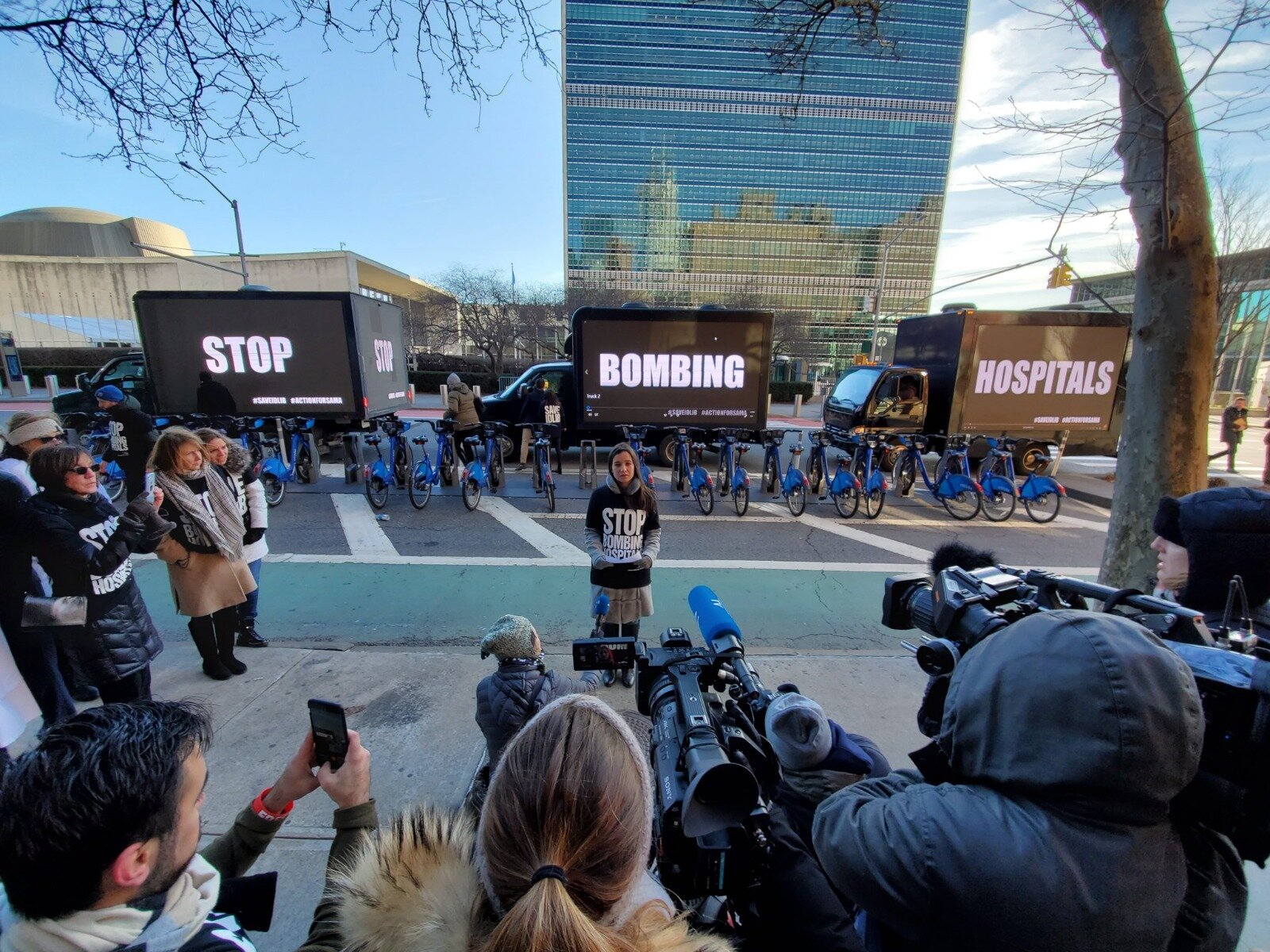



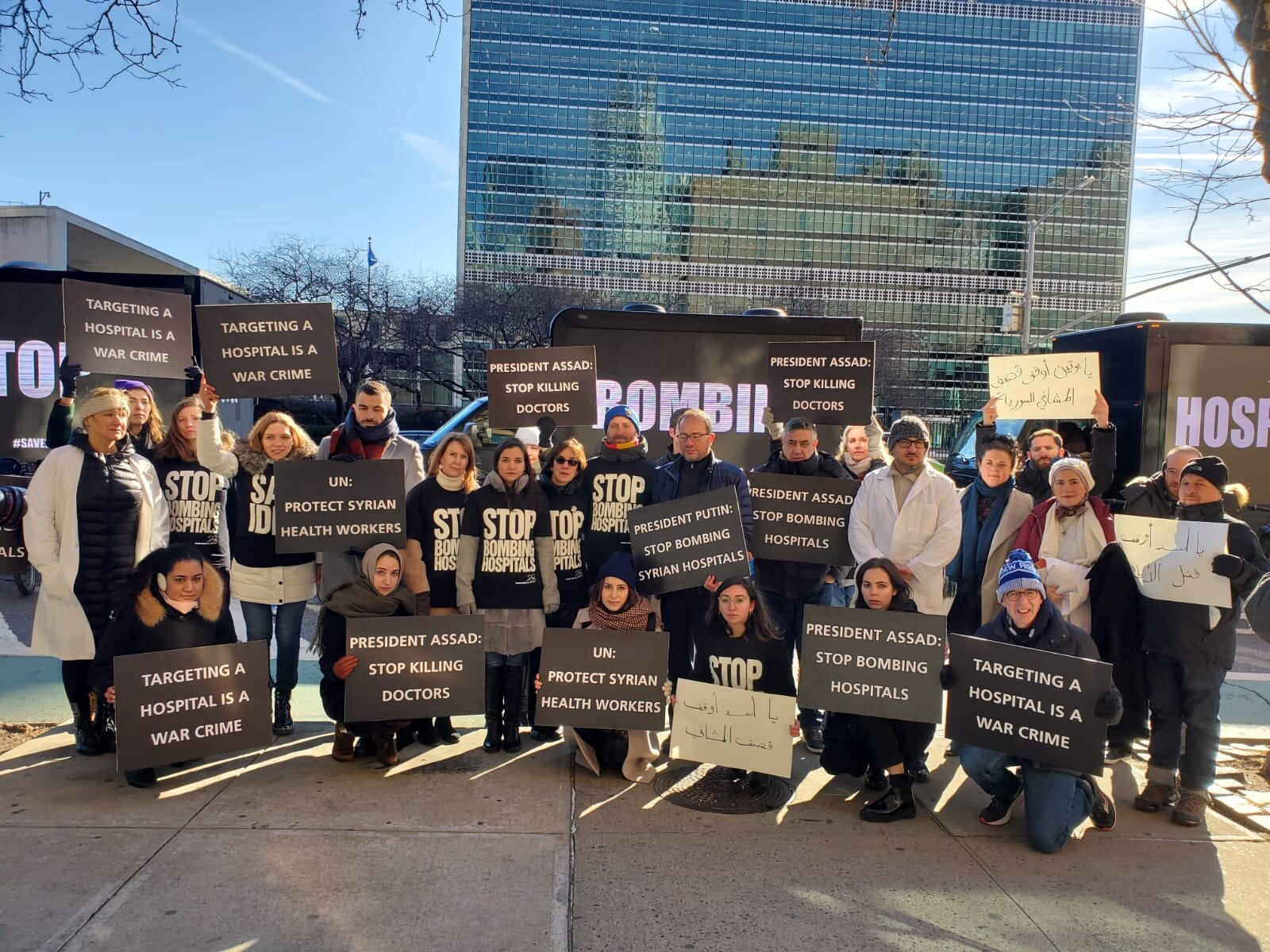

Set against the backdrop of UN HQ, Waad stood in front of billboard trucks “STOP” “BOMBING” “HOSPITALS,” (rotating in English, Russian, and Arabic), to share poignant, powerful messages from doctors on the ground in Syria...
“My brother’s house was targeted and hit directly by three back-to-back airstrikes. He and his wife Salem, injured in the attacks, lost their children: five-year-old Jenna, three-year-old Safaa, and one-and-a-half-year old Mohammed. Salem was in her first trimester when the attack happened and lost her unborn child. First responders worked for two hours to evacuate my brother and his wife from the devastated remains of the house. Both of them had sustained severe injuries all over their bodies. My brother was taken to one of the border hospitals for treatment to his spinal cord.”
““I hope in 2020, when I wake up in the morning and read the news, I don’t read about dismembered children. I hope our children will go back to school and live a normal childhood like any other child.” ”
““Being a medical worker in Syria is extremely challenging. I’ll never forget the day our hospital was targeted twice in one day. That day I was in the hospital. We had to pull ourselves together and keep going to save as many lives as possible.” ”
““When we treat the displaced during one of our response efforts, we have mixed emotions. On the one hand, we are happy to provide medical services to our patients, but at the same time we are saddened by the fact that they were forced to leave their homes.” ”
“ For Sama is not just a film for me. It is my life. I survived for a reason, and through my filmmaking, I was able to give a platform to Syrian civilians being killed silently.” said Waad. “I am here to remind the international community that hospitals are not targets, children should be protected and no-one should have to flee their home.” #stopbombinghospitals #actionforsama

